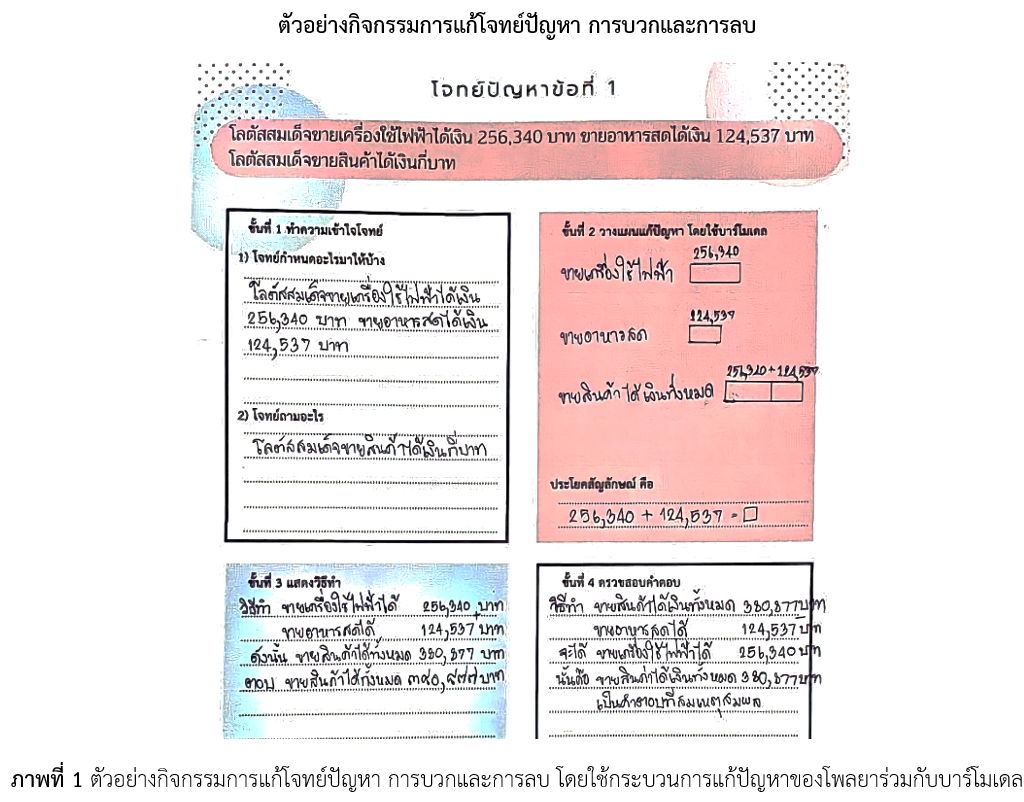การพัฒนาความสามารถในการแก้โจทย์ปัญหาคณิตศาสตร์ เรื่อง การบวกและการลบของนักเรียนชั้นประถมศึกษาปีที่ 4 โดยใช้กระบวนการแก้ปัญหาตามแนวคิดของโพลยาร่วมกับบาร์โมเดล
Main Article Content
บทคัดย่อ
การวิจัยครั้งนี้มีวัตถุประสงค์ 1) เพื่อเปรียบเทียบความสามารถในการแก้โจทย์ปัญหา การบวกและการลบ ก่อนและหลังใช้กระบวนการแก้ปัญหาของโพลยาร่วมกับบาร์โมเดล 2) เพื่อเปรียบเทียบความสามารถในการแก้โจทย์ปัญหา หลังใช้กระบวนการดังกล่าว กับเกณฑ์ร้อยละ 70 และ 3) เพื่อศึกษาระดับความพึงพอใจของนักเรียนหลังการจัดการเรียนรู้ กลุ่มตัวอย่างที่ใช้ในการวิจัย ได้แก่ นักเรียนชั้นประถมศึกษาปีที่ 4 ที่กำลังศึกษาในภาคเรียนที่ 1 ปีการศึกษา 2565 โรงเรียนบ้านกอกวิทยาคม จำนวน 24 คน ซึ่งได้มาจากการสุ่มแบบเจาะจง เครื่องมือที่ใช้ในการวิจัย ได้แก่ แผนการจัดการเรียนรู้ แบบทดสอบความสามารถการแก้โจทย์ปัญหา และแบบประเมินความพึงพอใจ สถิติที่ใช้ในการวิเคราะห์ข้อมูล ได้แก่ ค่าเฉลี่ย ร้อยละ ค่าเบี่ยงเบนมาตรฐานและการทดสอบโดยใช้สถิติ t-test ผลการวิจัยพบว่า 1) ความสามารถในการแก้โจทย์ปัญหาทางคณิตศาสตร์ หลังเรียนสูงกว่าก่อนเรียนอย่างมีนัยสำคัญทางสถิติที่ระดับ .05 2) ความสามารถในการแก้โจทย์ปัญหาทางคณิตศาสตร์ โดยใช้กระบวนการสูงกว่าเกณฑ์ร้อยละ 70 3) ความพึงพอใจของนักเรียนที่มีต่อการจัดการเรียนรู้โดยใช้กระบวนการแก้ปัญหาของโพลยาร่วมกับบาร์โมเดล อยู่ในระดับมาก (x ̅ = 4.50, S.D. = 0.45)
Article Details

อนุญาตภายใต้เงื่อนไข Creative Commons Attribution-NonCommercial-NoDerivatives 4.0 International License.
วารสารวิทยาศาสตร์และวิทยาศาสตร์ศึกษา (JSSE) เป็นผู้ถือลิสิทธิ์บทความทุกบทความที่เผยแพร่ใน JSSE นี้ ทั้งนี้ ผู้เขียนจะต้องส่งแบบโอนลิขสิทธิ์บทความฉบับที่มีรายมือชื่อของผู้เขียนหลักหรือผู้ที่ได้รับมอบอำนาจแทนผู้เขียนทุกนให้กับ JSSE ก่อนที่บทความจะมีการเผยแพร่ผ่านเว็บไซต์ของวารสาร
แบบโอนลิขสิทธิ์บทความ (Copyright Transfer Form)
ทางวารสาร JSSE ได้กำหนดให้มีการกรอกแบบโอนลิขสิทธิ์บทความให้ครบถ้วนและส่งมายังกองบรรณาธิการในข้อมูลเสริม (supplementary data) พร้อมกับนิพนธ์ต้นฉบับ (manuscript) ที่ส่งมาขอรับการตีพิมพ์ ทั้งนี้ ผู้เขียนหลัก (corresponding authors) หรือผู้รับมอบอำนาจ (ในฐานะตัวแทนของผู้เขียนทุกคน) สามารถดำเนินการโอนลิขสิทธิ์บทความแทนผู้เขียนทั้งหมดได้ ซึ่งสามารถอัพโหลดไฟล์บทความต้นฉบับ (Manuscript) และไฟล์แบบโอนลิขสิทธิ์บทความ (Copyright Transfer Form) ในเมนู “Upload Submission” ดังนี้
1. อัพโหลดไฟล์บทความต้นฉบับ (Manuscript) ในเมนูย่อย Article Component > Article Text
2. อัพโหลดไฟล์แบบโอนลิขสิทธิ์บทความ (Copyright Transfer Form) ในเมนูย่อย Article Component > Other
ดาวน์โหลด ไฟล์แบบโอนลิขสิทธิ์บทความ (Copyright Transfer Form)
เอกสารอ้างอิง
Bankokwittayakhom School. (2021). Ordinary Educational test of Grade 6 students for Bankokwittayakhom School in 2021 academic year (in Thai). Kalasin: Bankokwittayakhom School.
Bhattiyathani, S. (2012). Educational Research Techniques (in Thai). Kalasin: Prasankarnpim.
Kanachan, J., Kaewkhamson, K., Nongharnpituk, P. and Khansila, P. (2020). A study of learning achievement in the applications of derivative topic for Grade-12 students taught by incorporating GeoGebra program into mathematics problem-solving based on Polya's method (in Thai). Journal of Science and Science Education, 3(1), 73-83.
Kartphakhin, N., Chulniam, N. and Phothisarn, P. (2022). A development of mathematics skill drills on situation problems in the line of Polya and bar model on topic ‘positive minus multiply and divide’ for Prathomsuksa 4 students (in Thai). MBU Education Journal, Faculty of Education Mahamakut Buddhist University, 10(2), 110–123.
Karuhapan, L. and Khamra, N. (2022). The Effect of Learning Management According to Polya’s Problem Solving Process with Bar Model Techniques Towards Problem Solving Ability and Attitudes Towards Mathematics Learning of Matthayomsuksa 2 Students (in Thai). Social Sciences Research and Academic Journal, 17(2), 213–226.
Ketprakob, D., Intep, S. and Kaewkhao, A. (2021). The Study of problem solving ability on addition and subtraction using polya’s problem solving concept with bar model technique for Prathomsuksa 4 students (in Thai). Journal of Graduate School Sakon Nakhon Rajabhat University, 18(83), 63–71.
Lapawae, N. (2016). Organizing Learning Activity for Problem Solving Development by Polyas’ Problem Solving Processes Co-operate with Bar Model for Second Grade Students (in Thai). Kasalongkham Research Journal Chiang Rai Rajabhat University, 10(2), 55–64.
Saiyod, L. and Saiyod, A. (1995). Techniques in Educational Research (in Thai). Bangkok: Suweeriyasarn.
Siriphat, P., Nongharnpituk, P. and Khansila, P. (2019). The development of mathematics problem solving abilities on the application of linear equations with one variable of Grade-8 students using emphasized on Polya’s problem solving methods (in Thai). Journal of Science and Science Education, 2(1), 23–33.
Thaneepoon, C. and Viriyapong, N. (2020). Development of the arithmetic problem solving abilities of Prathomsuksa 3 students using Polya’s problem solving process with bar model (in Thai). Journal Of Humanities and Social Sciences Surin Rajabhat University, 22(1), 93–106.
The Ministry of Education. (2008). The Basic Education Core Curriculum B.E. 2551 (A.D. 2008) (in Thai). Bangkok: Institute for the Promotion of Teaching Science and Technology.
Yangyeun, N. and Panawong, C. (2020). A development of learning activities by Polya’s processes co-operate with bar model to promote problem solving skills of addition and subtraction of fractions for Prathomsuksa 4 students (in Thai). Journal of Education Research, 15(2), 67–79.


